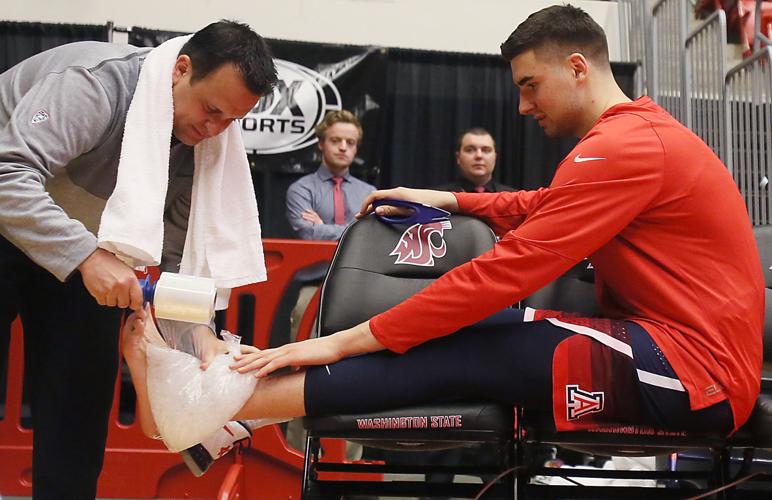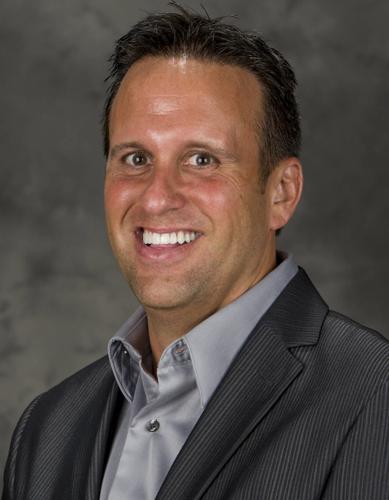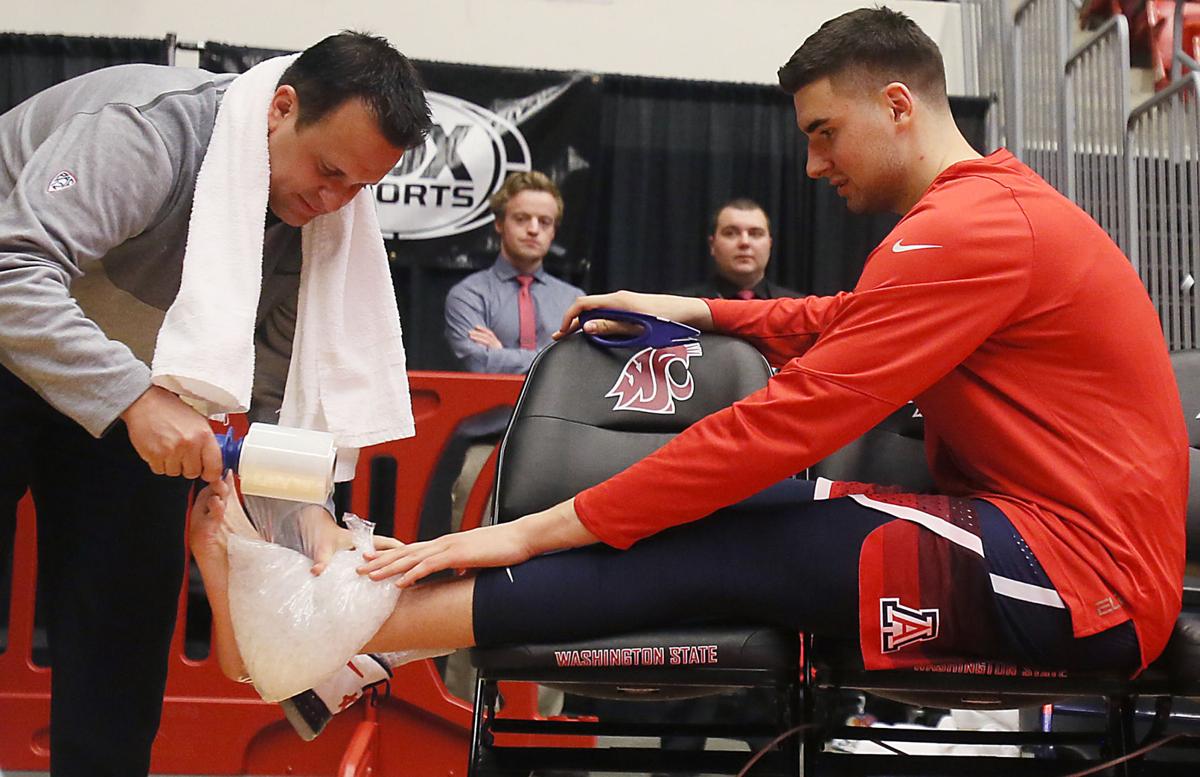After finishing their first few full basketball practices last week, the Arizona Wildcats took an “off-day” Sunday that was not to be mistaken for freedom.
That went for even Justin Kokoskie, the team’s athletic trainer.
“I couldn’t go to church with my family,” Kokoskie said. “It’s a decision I made. I’m just being extra careful. I don’t want to jeopardize anybody else.”
That’s the way it is when you are living inside the Wildcats’ 2020 preseason, with COVID-19 testing and contact tracing implications woven into every day of your existence.
Most Arizona players are up by 5 a.m., testing six mornings a week as part of a routine that also includes lifting, breakfast, academics, training room therapy, meetings and practices — and thinking about every other move they make.
As the Wildcats’ trainer, Kokoskie says he can’t easily distance from players receiving hands-on therapy, and he — and Arizona’s players — know that every contact they make could have implications.
“It’s just been an education process and I think they’re learning through examples,” Kokoskie said.
“We’re not telling them to stop living their lives. What we’re telling them is, ‘Just have the attitude that you’re infected every day, everybody you are around is infected, and if you keep your distance (and) keep our protocols in mind, you’re going to be in a much better, better situation.’
“We’re paying attention to science during this process and we’re relying on a lot of doctors. I know people far above me are working with county health professionals and county health administrators to make sure we’re doing what’s right.”
The process continues every day at 6 a.m. or 7 a.m., when basketball players start shuffling into the Lowell-Stevens Football Facility for their daily antigen tests.
Their swabs are then put under what Kokoskie called a strict “chain of custody” to be professionally analyzed on campus, with the results back in as little as 30 minutes. A PCR test is also given weekly to give an additional layer of information, with those results returning in 48 hours.
While the antigen test results allow the day to proceed, the days are never normal.
In an interview with the Star, Kokoskie explained what life has been like since the Wildcats began daily testing late last month and consequently were able to jump into full-contact practices:
With a workaholic team that has players often looking to get in some extra work, Kokoskie said getting players tested early hasn’t been a problem.
“From a basketball standpoint, these guys work their tails off. I’ve gotten there before 5 and sometimes guys are waiting outside, calling me like, ‘I know it’s almost 5, Justin. Can I get into the RJ? I just want to get some extra shots up.’
“They’re getting up in the morning, they’re getting extra shots up, conditioning, getting their weightlifting done. They’re focused on academics. And then, after academics, they go to treatment, and get ready for practices you practice. By then, it’s nighttime.”
Off the court, the Wildcats have been encouraged to live together but stay in their own rooms, and to keep a distance from others inside even while relaxing.
“We are trying to create a bubble as best we can. Ultimately, we can’t control every single variable … To be honest, when they’re doing stuff on their own, we’re still following all protocols. They’re buying in as best as they can. We can’t keep an eye on them 24/7 but this group of guys has really kind of bought in. They take it serious and as hard as they’re working, there’s not a lot of downtime right now.”
Players are constantly reminded that every step they take matters, that a negative test is not a get-out-of-jail-free card because a positive test the next day still would require tracing back to that point. And contact tracing could force multiple players to quarantine, costing the Wildcats practice time or even a game.
“Every case would be different (with a positive test). There’s so many more questions and answers, it’s hard to use one example. But you would want to know what did they do, who were they with, have they followed all the protocols, who are their roommates. Have they gone to dinners with people?
“And (with basketball) we’ve slowly incorporated film sessions and the locker room. It’s not like all of a sudden we said, ‘Hey guys, the locker room is open; go ahead, it’s a free-for-all.’ No. Say you have the older guys — they can go in 15 minutes, space out, follow the protocols, get their shower and get out of there, that kind of thing. And then we slowly kind of incorporate that with film as well. We actually couldn’t even use our film room early on because the idea of having everybody come together and do film makes no sense during times like this.”
Trust is essential, which could be challenging considering that the Wildcats have eight players who joined them for the first time this fall. One of them, freshman guard Kerr Kriisa, even played before 1,500 fans in a national team game in July in his home country of Estonia — which had extremely low COVID-19 numbers.
“I noticed that right away when Kerr got here. He’s looking at me like, ‘You’re gonna have me do what? I just played in front of 5,000 people.’ ... But I think they just kind of accepted this is what it is, and I’ve told them from day one: ‘If you think if there’s any risk, if there’s something that I’m doing, that one of our staff members is doing, I want you to tell me right away. Is there anything we can do better?’
“I think when the student-athletes know that you’re putting them before yourself, that’s how you have success.”
The Wildcats are reminded of all this at practices, when UA coach Sean Miller and Kokoskie address them as they sit down on the court for stretch work.
“It’s a good 10 minutes of where Coach talks about academics, having the proper attitude on campus, drug testing … I mean, he goes over a lot of things in those circle stretches. And that’s my chance to kind of touch on a COVID issue.
“I’ll tell the guys during practice, ‘Yes, you’re not wearing your mask when we’re having full-out contract drills, but when there’s a pause in play and coach comes to talk to you, pull the mask up.’ It’s honestly been a learning experience.
“I’d say this group does a good job, but even letting your guard down one day or one weekend can set us back. That’s why I like (saying I’m) cautiously optimistic.”
Miller has also drawn the big picture clearly.
“Sean has done a great job of telling our basketball student-athletes that this is bigger than them. It’s about protecting everybody else. It’s about protecting your fellow citizens. It’s about protecting people in the city of Tucson. Right now, it’s challenging for everybody and we’re hoping that maybe sports can bring it a little bit of entertainment.”
Rim shots
- Forward Jordan Brown, who sat out last season as a transfer from Nevada, won the UA’s first weekly gold jersey for the best overall production in practice.
- Former Wildcat Ryan Anderson said on Twitter he is undergoing surgery after suffering a serious knee injury in Lithuania earlier this month.
- Arizona has offered a scholarship to four-star Class of 2021 guard Shane Dezonie, according to Brewster Academy coach Jason Smith. Also being recruited by ASU and several other high-major programs, Dezonie is rated No. 97 overall in his class by ESPN and 125th by 247Sports.com.







